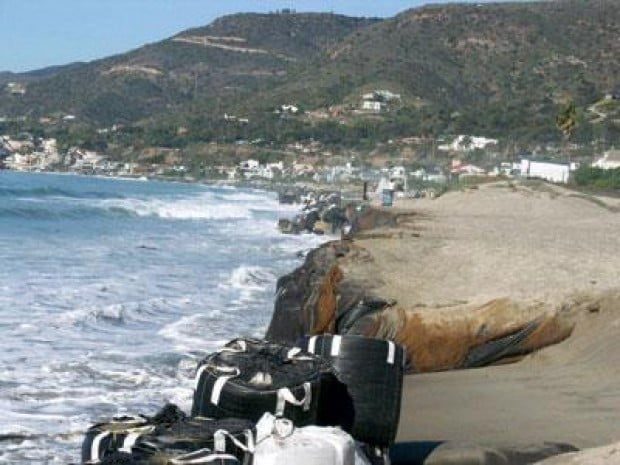
A story that combines celebrity homeowners, environmentalists, global warming and a $20 million price tag for beach sand gets plenty of interest outside of Malibu, it turns out.
Although the saga of Broad Beach losing its broad beach to natural forces has been ongoing for many years, the plight of 114 property owners seeking to protect their properties, and their quest to replenish the two-mile length of beach from Trancas Creek to Point Lechuza, has been largely a local issue until now.
Twice last week, “CBS This Morning” ran a nationally televised segment on the Broad Beach issue called “Sand a hot commodity in Wake of Storms, Widespread Erosion,” featuring interviews with former Malibu Mayor Jefferson “Zuma Jay” Wagner.
Manhattan Beach Mayor Wayne Powell also told CBS, “Malibu tried to steal our sand, and all the money in Malibu cannot buy Manhattan Beach sand.”
However, Kenneth Ehrlich, the attorney for the Broad Beach homeowners, said that while the homeowners did analyze the site off Manhattan Beach as a potential site before ultimately rejecting it, the state of California actually owns the mineral rights to it, not the City of Manhattan Beach.
Entertainment magazine The Hollywood Reporter also ran an in-depth story last week on the project, in which it interviewed many of the key figures, including two of the board members heading up the sand replenishment effort— ”Modern Family” co-creator Steve Levitan and well-known entertainment attorney Marshall Grossman.
When Grossman was asked in a telephone interview why he thought the Broad Beach project was suddenly garnering so much media attention after being in the works for two years, he said, “The damage the East Coast suffered from Hurricane Sandy last month raised serious questions about rebuilding, lack of flood insurance and the restoration of beaches.”
He felt some reporters had been directed to Broad Beach because it offered a solution to the problem of what to do when a beach washes away.
“The situation in Malibu offers an opportunity for the nation,” Grossman said. “If we can make this work here, it will be a marvelous example for other communities and states on how to restore a beach.”
Other contributing factors, Grossman said, might be favorable articles about successful sand restoration projects on the East Coast that have recently been published.
But that was not the conclusion that Wagner drew from the project in his interview with CBS. The prospect of sea level rise has many coastal residents bracing for costly—and potentially unsuccessful—efforts at preserving beaches due to erosion.
“It’s finally starting to sink in that it’s not going to be an easy task,” Wagner said. “Nobody is willing to give up this asset. This is why people come to the beach.”
Meanwhile, the Broad Beach Geological Hazards Abatement District (GHAD)—the homeowners group that has banded together to pay for the project—continues its search to find sand for the eroded beach.
Ehrlich said offshore sources from Manhattan Beach have been ruled out, although offshore sand at Dockweiler Beach (near LAX airport) is still in the running.
“Some inland sand sources are acceptable, but the problem is the environmental impact of transportation as well as the cost,” Ehrlich said. “We’d much prefer an ocean transport method.”
Trucking in sand from inland sources such as the Mojave Desert, as was speculated in the “CBS This Morning” report, could reportedly add significant cost to the project.
For now the project remains in a holding pattern while awaiting final approval from two state agencies: the California Coastal Commission (CCC) and the California State Lands Commission as primary agencies. The two agencies must also approve the sand source once it is found.
In the latest action, the Malibu City Council last week voted to let the Coastal Commission handle the city’s portion of the approval process, adopting what is known as a Consolidated Coastal Development Permit. The planning department recommended the action, saying only 17 percent of the project was within the city’s jurisdiction on “dry land” and the CCC planned to appeal any decision Malibu made anyway.
City attorney Christi Hogin supported their position, advising that the city would not be giving up any decision-making power, and that the primary agencies would be holding a series of public hearings with plenty of opportunities for citizens to weigh in on the project.
Planning Director Joyce Parker-Bozylinski, noting concerns about public access raised by activist Hans Laetz, responded that, “One of the CCC’s primary goals is coastal access; so I’m pretty sure that will be highly protected and analyzed.”
Sherry Pemberton of State Lands said the comment period on the project has been extended until December 22, and the matter will be on the agenda of the next State Lands Commission meeting sometime in February.


